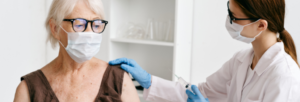Preparing for Your COVID-19 Vaccine
January 28, 2022
COVID-19 vaccines are effective at protecting you from getting sick even if you have had COVID-19. Vaccination is an important tool to help us get back to normal. This information will help you prepare for your COVID-19 vaccination.
Learn more about the different types of COVID-19 vaccines and how they work.
- Pfizer-BioNTech COVID-19 vaccine for everyone ages 5 years and older
- Moderna COVID-19 vaccine for adults aged 18 years and older
- Johnson & Johnson’s Janssen COVID-19 vaccine for adults ages 18 years and older
Learn more about the benefits of getting a COVID-19 vaccination.
Plan and Prepare for Your COVID-19 Vaccination
- Find out how to get a COVID-19 vaccine
- Get vaccinated even if you have already had COVID-19
- If you are getting a COVID-19 vaccine that requires two doses, be sure to schedule an appointment for your second shot
- Get a COVID-19 vaccine and any other recommended vaccines, including a flu vaccine, at the same visit
- Learn more about routine medical procedures and screenings and COVID-19 vaccination
Who should Get a COVID-19 Vaccine?
- COVID-19 vaccination is recommended for everyone ages 5 years and older
- Moderately or severely immunocompromised people who are ages 5 years and older and received a Pfizer-BioNTech primary vaccine series or ages 18 years and older received a Moderna primary vaccine series should receive an additional primary dose of the same vaccine at least 28 days after their second one
- Everyone ages 12 years and older who is fully vaccinated against COVID-19 should get a booster shot. Learn more about booster shots
Get Vaccinated Even If You Had COVID-19 and Think You Have Natural Immunity
You should get a COVID-19 vaccine even if you already had COVID-19.
Getting sick with COVID-19 offers some protection from future illness with COVID-19, sometimes called “natural immunity”. The level of protection people get from having COVID-19 may vary depending on how mild or severe their illness was, the time since their infection, and their age; and no currently available test can reliably determine if you are protected after a COVID-19 infection.
All COVID-19 vaccines currently available in the United States are effective at preventing COVID-19. Getting a COVID-19 vaccine gives most people a high level of protection against COVID-19, even in people who have already been sick with COVID-19.
Emerging evidence shows that getting a COVID-19 vaccine after you recover from COVID-19 infection provides added protection to your immune system. One study showed that, for people who already had COVID-19, those who do not get vaccinated after their recovery are more than 2 times as likely to get COVID-19 again than those who get fully vaccinated after their recovery.
People Who Should Wait to Get Vaccination
If you were treated for COVID-19 with monoclonal antibodies or convalescent plasma while sick with COVID-19, you should wait 90 days before getting a COVID-19 vaccine. If you received monoclonal antibodies or convalescent plasma after you were exposed to someone with COVID-19 to prevent you from getting sick, you should wait 30 days before getting a COVID-19 vaccine. Talk to your healthcare professional if you are unsure what treatments you received or if you have more questions about getting a COVID-19 vaccine.
If you or your child have a history of multisystem inflammatory syndrome in adults or children, consider delaying vaccination until you have recovered from being sick and for 90 days after the date of diagnosis of MIS-A or MIS-C. Learn more about the clinical considerations for people with a history of MIS-A or MIS-C.
Considerations for Taking Medication before Getting Vaccinated
For most people, it is not recommended to avoid, discontinue, or delay medications that you are routinely taking for prevention or treatment of other medical conditions around the time of COVID-19 vaccination.
If you are taking medications that suppress the immune system, you should talk to your healthcare provider about what is currently known and not known about the effectiveness of getting a COVID-19 vaccine. Ask about the best timing for receiving a vaccine. Learn about COVID-19 vaccines for moderately to severely immunocompromised people.
Most people who take medication can get a COVID-19 vaccine. Taking one of the following medications is not, on its own, a reason to avoid getting your COVID-19 vaccination:
- Over-the-counter medications (non-prescription)
- Non-steroidal anti-inflammatory drugs (NSAIDs) (naproxen, ibproufen, aspirin, etc.)
- Acetaminophen (Tylenol, etc.)
- Biologics or biologic response modifiers that treat autoimmune diseases
- Chemotherapy or other cancer treatment medications
- Antiviral medication
- Antibiotics
- Statins
- Blood pressure medications/antihypertensives (amlodipine, lisinopril, etc.)
- Diuretics
- Thyroid medications
- Antidepressants
- Metformin
- Diabetic medications
- Insulin
- Steroids (prednisone, etc.)
This is not a complete list. It is meant to provide some examples of common medications. Taking any of these medications will not make COVID-19 vaccination harmful or dangerous.
If you have questions about medications that you are taking, talk to your healthcare professional or vaccination providers.
For more information, please visit
visit https://www.cdc.gov/coronavirus/2019-ncov/vaccines/prepare-for-vaccination.html.